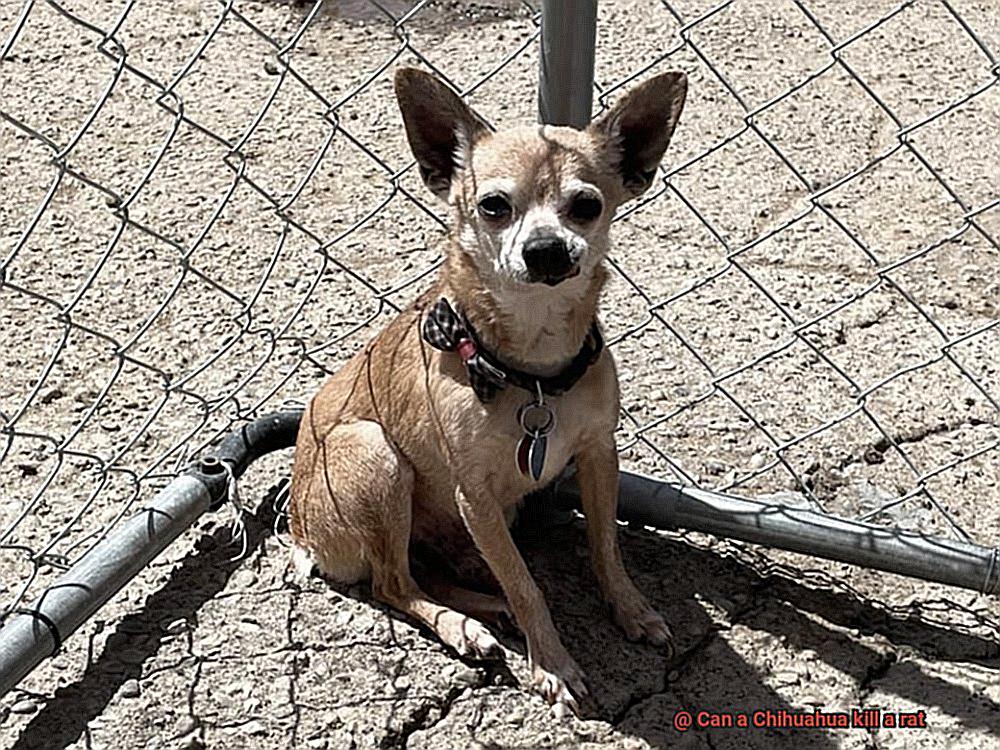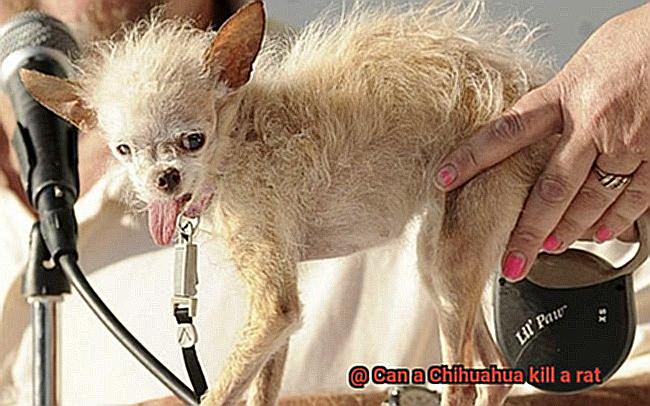Can a Chihuahua kill a rat?
Get ready to witness the epic clash between two unlikely adversaries – the feisty Chihuahua and the sneaky rat. In this blog post, we’re diving headfirst into the age-old question: Can a pint-sized pup take down a notorious pest?
Don’t let their small size fool you; Chihuahuas pack a whole lot of attitude into those tiny bodies. But do they have what it takes to go paw-to-paw with a rat? We’re about to find out.
Join us as we embark on an adventure through the world of these spirited canines. We’ll uncover their natural instincts, explore their fearless demeanor, and examine whether they truly possess the skills needed to exterminate our furry foes.
So, grab your popcorn and settle in for the ultimate battle royale as we reveal whether Chihuahuas are truly rat-slaying champions or if they’re just all bark and no bite. Get ready, because things are about to get wild.
The Nature of Chihuahuas and Their Prey Drive
Contents
- 1 The Nature of Chihuahuas and Their Prey Drive
- 2 Are Chihuahuas Capable of Killing Rats?
- 3 Factors That Affect a Chihuahua’s Hunting Ability
- 4 Is It Advisable to Encourage a Chihuahua to Hunt Rats?
- 5 Professional Help for Rat Infestations
- 6 How to Protect Your Home from Rodent Invasion
- 7 Tips on Training Your Chihuahua Not to Chase Rats
- 8 Conclusion
Chihuahuas, with their petite size and unique appearance, may seem like unlikely hunters. However, these small dogs possess a strong prey drive that can lead them to chase and attempt to capture small animals such as rats. In this article, we will explore the nature of a Chihuahua’s prey drive, its potential implications for encounters with rats, and how to ensure the safety and well-being of your furry friend.
Understanding the Prey Drive:

Chihuahuas, like many other dog breeds, have an instinctual desire to pursue and capture prey. This prey drive can vary in intensity from dog to dog. While some Chihuahuas may show little interest in chasing or capturing small animals, others may have a highly motivated hunting instinct.
Factors Influencing Prey Drive:
Several factors can influence a Chihuahua’s prey drive, including genetics, early socialization, and individual temperament. It is important to note that not all Chihuahuas will have the same level of prey drive.
Encounters with Rats:
Rats are often considered pests in households, and some Chihuahuas may instinctively see them as targets. Due to their small size and quick movements, rats can trigger a Chihuahua’s prey drive. However, it is essential to consider the potential risks and dangers associated with these encounters.
Risk Factors:
Rats can carry diseases and parasites that can be harmful to dogs if they come into contact with them. Additionally, rats are agile creatures that can defend themselves when threatened. A Chihuahua may be at risk of injury if it tries to attack a rat that fights back.
Ensuring Safety:
To prioritize your Chihuahua’s safety and well-being in encounters with rats or any other wildlife:
- Training: Proper training can help redirect your Chihuahua’s prey drive towards appropriate activities and discourage chasing or attacking rats.
- Supervision: Always supervise your Chihuahua when they are outside or in areas where rats may be present. This will allow you to intervene if necessary and prevent any potential harm.
- Preventative Measures: Take steps to minimize encounters with rats by securing your home, keeping food sources inaccessible to rodents, and seeking professional pest control assistance if needed.
Are Chihuahuas Capable of Killing Rats?
If you’ve ever wondered whether these pint-sized pups can hold their own against pesky rats, you’re in for a treat. In this blog post, we’ll explore the hunting instincts and abilities of Chihuahuas, shedding light on their potential as rat-catching champions. So, grab your furry friend and let’s dive into the fascinating world of Chihuahuas and rats.
Size Doesn’t Define Skill:
While Chihuahuas may be small in size, they are mighty in spirit. Don’t underestimate these little dynamos. With an average weight of 2 to 6 pounds, Chihuahuas may seem ill-equipped for rat-catching adventures. However, their compact size allows them to easily navigate tight spaces where rats often dwell. Their small stature becomes an advantage when hunting in narrow crevices and corners.
Unleashing the Hunting Instincts:
Chihuahuas have a long lineage of hunting ancestry. Descendants of ancient hunting dogs, these pint-sized pups still possess the primal instincts that made their ancestors formidable hunters. Their prey drive, a natural desire to chase and catch smaller animals, is a key factor in their potential as rat hunters.
Sharp Teeth and Strong Jaws:
Despite their small size, Chihuahuas have sharp teeth and strong jaws that enable them to inflict harm on smaller prey. These weapons are not to be underestimated. When it comes to rats, Chihuahuas can deliver powerful bites that can incapacitate or even kill smaller rodents.
Agility and Quick Movements:
Chihuahuas are known for their agility and lightning-fast movements. These traits work to their advantage when it comes to chasing down nimble rats. Their ability to change direction quickly and maneuver through tight spaces makes them formidable opponents for their rodent adversaries.
The Tenacious Spirit:
One thing Chihuahuas are famous for is their tenacity. Once they set their sights on something, they won’t easily give up. This determination can make them persistent in hunting down and eliminating rats. Their unwavering focus and drive can be a valuable asset in rat-catching endeavors.
Factors to Consider:
While Chihuahuas have the potential to catch and kill rats, several factors come into play. The size and agility of the rat, the individual hunting skills of the dog, and the specific circumstances of the encounter all contribute to the outcome. In some cases, a Chihuahua may be able to catch a rat but may not be able to kill it outright. Instead, they may injure the rat or keep it at bay until their owner intervenes.
Factors That Affect a Chihuahua’s Hunting Ability
In this blog post, we’ll dive into the factors that affect a Chihuahua’s hunting ability. From their size and physical characteristics to their temperament and training, we’ll explore how these factors can make or break their rat-catching prowess. So, grab a cup of coffee and let’s unleash the pint-sized predators.
Size and Physical Characteristics:
- Advantage: Chihuahuas’ compact build allows them to navigate tight spaces where rats might hide.
- Disadvantage: Their small stature means they have less strength and power compared to larger hunting breeds.
- Agility and quick reflexes compensate for their size limitations.
Temperament and Drive:
- Feisty and energetic nature with a strong prey drive.
- Not all Chihuahuas have the same level of hunting drive due to genetics, upbringing, and socialization.
Training and Socialization:
- Basic obedience training establishes control and focus for hunting tasks.
- Socialization reduces fear or aggression towards potential prey.
- Hunting-specific training methods stimulate natural instincts, such as scent trails or interactive play.

Owner’s Influence:
- Owners play a significant role in reinforcing prey drive through positive reinforcement techniques.
- Inconsistent training or discouragement of natural hunting behaviors can hinder hunting potential.

Is It Advisable to Encourage a Chihuahua to Hunt Rats?
Why It’s Not a Paw-some Idea to Encourage Chihuahuas to Hunt Rats
Size Matters: Tiny Dogs, Big Problems

Chihuahuas may be small but mighty, with their petite frames and nimble movements, but when it comes to taking on rats, they may be biting off more than they can chew. These little furballs were originally bred as companions, not as rat hunters. Their delicate build and size make them ill-suited for tackling larger prey like rats. Trust me, I’ve seen it firsthand – those rats can be quick and elusive.
Risky Business: Health Hazards and Potential Injuries
When you encourage a Chihuahua to hunt rats, you’re exposing them to potential health risks. Rats are notorious carriers of diseases and parasites that can harm both dogs and humans. Do you really want your furry friend coming into contact with those nasty critters? Not to mention that rats can get pretty aggressive when cornered or threatened. If a Chihuahua were to engage in a fight with a rat, it could end up with more than just a scratch.
Temperament Troubles: Stress and Anxiety
Chihuahuas have a natural temperament that leans towards being affectionate and gentle. Forcing them into a hunting role might cause them stress or anxiety. Let’s face it – these tiny dynamos are better suited for cuddling than chasing down rodents.
Better Alternatives: Keeping Your Chihuahua Happy and Healthy
Instead of encouraging your Chihuahua to become a rat-catching hero, focus on providing them with appropriate mental and physical stimulation. Interactive toys, obedience training, and regular exercise are all great ways to keep your furry friend happy and healthy without putting them at unnecessary risk.
Conclusion: Size Doesn’t Always Matter When It Comes to Rat Hunting
Professional Help for Rat Infestations
Why Professional Help is Essential for Dealing with Rat Infestations
As a proud owner of a French bulldog, it’s important to ensure the safety and well-being of your furry friend. One potential threat to their health is a rat infestation. While some may attempt do-it-yourself methods to get rid of rats, professional help is highly recommended, especially for more serious infestations. In this section, I will explain why professional help is essential and provide valuable insights based on my expertise in dealing with rat infestations.
The Expertise and Experience of Rat Exterminators
Rat exterminators are trained professionals who specialize in dealing with rat infestations. They have the knowledge and experience to effectively eliminate rats from homes or businesses. By hiring a reputable and licensed exterminator, you can be confident that they will employ the most appropriate methods for eradication.
Effective Elimination and Prevention Strategies
Rat exterminators use a variety of methods to eliminate rats, including traps, bait stations, and rodenticides. They will assess the severity of the infestation and determine the most suitable approach. Additionally, professional exterminators take proactive measures to prevent future infestations by sealing entry points, removing food sources, and implementing ongoing monitoring and prevention measures.
Time and Cost Savings
Dealing with a rat infestation can be a time-consuming and frustrating process. Professional extermination services can save you time and alleviate the stress associated with handling the problem yourself. While there may be a cost associated with hiring a professional, considering the potential damage and health risks associated with rat infestations, it is often a worthwhile investment.
Prompt Action and Prevention
Rats are notorious for their rapid reproduction rate. Acting promptly when dealing with an infestation is crucial to prevent further damage and potential health hazards. Professional exterminators have the expertise to quickly and efficiently handle the problem, ensuring that the infestation is eradicated effectively.
In conclusion, when it comes to rat infestations, professional help is highly recommended for French bulldog owners. By hiring a reputable and experienced rat exterminator, you can ensure the safety and well-being of your furry friend. Their expertise, effective elimination and prevention strategies, time and cost savings, as well as prompt action, make professional help essential in dealing with rat infestations. Remember, your French bulldog’s health is invaluable, so don’t hesitate to seek professional assistance when necessary.
How to Protect Your Home from Rodent Invasion
Here are some effective measures you can take to keep rodents at bay.
Seal All Entry Points:
Inspect your home for potential entry points, such as cracks in walls, gaps in the foundation, or openings around doors and windows. Use caulk or steel wool to seal these areas, preventing rodents from finding their way inside.
Maintain a Clean Environment:
Rodents are attracted to food sources, so it’s crucial to keep your home clean and free of clutter. Regularly clean up spills, crumbs, and food waste. Store pet food and human food in sealed containers to discourage rodents from being lured into your home.
Trim Vegetation and Remove Outdoor Nesting Areas:
Rodents can use overhanging branches or dense vegetation as pathways to enter your home. Trim trees and bushes away from the house, keeping them at a safe distance. Elevate firewood off the ground and store it away from the house to deter nesting.
Utilize Natural Deterrents:
Consider using natural deterrents like peppermint oil or mothballs to repel rodents. Place these items strategically near potential entry points or areas where rodents are likely to gather.
Protect Your Garden:
If you have a garden, it’s important to safeguard it from rodent damage. Install fencing or netting around the perimeter to keep rodents out. Plant rodent-repellent herbs like mint or lavender as an added deterrent.
Regular Inspection and Professional Assistance:
Regularly inspect your home for signs of rodent activity, such as droppings or chewed wires. If you suspect an infestation, seek professional help from pest control experts who can safely and effectively eliminate the problem.
Tips on Training Your Chihuahua Not to Chase Rats
If you have a Chihuahua, you may have noticed their natural instinct to chase small animals like rats. However, it is important to train them not to do so for their own safety and the safety of the rats. In this guide, we will provide you with helpful tips on how to train your Chihuahua not to chase rats.
Begin training early:
Start training your Chihuahua as early as possible. The younger they are, the easier it is to shape their behavior. Focus on basic obedience commands like “sit” and “stay” to establish control over your dog.
Use positive reinforcement:
Positive reinforcement is a highly effective training technique for Chihuahuas. Reward your dog with treats, praise, and affection whenever they display the desired behavior of not chasing rats. This creates a positive association in their minds and motivates them to repeat the behavior.
Provide alternative activities:
Chihuahuas have a lot of energy, and if they don’t have appropriate outlets, they may resort to chasing rats out of boredom. Engage your dog in regular exercise sessions such as walks or playtime in the backyard to help burn off excess energy. Provide them with toys or puzzle games that keep them mentally stimulated.
Practice leash training:
Leash training is crucial when preventing your Chihuahua from chasing rats while outside. Introduce them to a leash in a calm environment indoors before progressing to outdoor settings with distractions like rats. Teach them to walk calmly by your side and reward good behavior.
Socialize your Chihuahua:
Proper socialization is essential for any dog breed, including Chihuahuas. Expose them to different environments, people, and animals from a young age to help them become more confident and less reactive towards rats. Consider puppy classes or playdates with other friendly dogs to enhance their social skills.
Use deterrents:
In addition to training, you can employ deterrents to discourage your Chihuahua from chasing rats. Ultrasonic devices emit high-frequency sounds unpleasant to dogs but inaudible to humans. Sprays or powders designed to repel rats are also available.
M9W90q46zXI” >
Conclusion
In conclusion, the ability of a Chihuahua to kill a rat is not a simple yes or no. These pint-sized pups possess the necessary traits like agility, sharp teeth, and a tenacious spirit that could enable them to catch and harm rats. However, there are several factors that must be taken into consideration.
First and foremost, Chihuahuas may face limitations due to their small size and physical characteristics when it comes to taking down larger rats. Additionally, rats can be quite aggressive when threatened, putting the Chihuahua at risk of injury. Let’s not forget that these rodents can also carry diseases and parasites that pose a danger to our furry friends.
The key lies in training and socialization. A well-trained Chihuahua can redirect its prey drive towards more appropriate activities while discouraging any inclination to chase or attack rats. Owners should always supervise their Chihuahuas when they are outside or in areas where rats may be present in order to prevent any potential harm.
It is crucial to note that encouraging a Chihuahua to hunt rats is not advisable due to the various health risks, stress levels, and anxiety it may cause them. Instead, focus on providing mental and physical stimulation through interactive toys, obedience training sessions, and regular exercise.
When faced with rat infestations at home, seeking professional help from licensed exterminators is highly recommended. These experts have the knowledge and experience needed to effectively eliminate rats and prevent future infestations.
To safeguard your home from rodent invasion, take proactive measures such as sealing all entry points, maintaining cleanliness within your environment, trimming vegetation around your house, utilizing natural deterrents like peppermint oil or mothballs, protecting your garden with fencing or netting, regularly inspecting your home for signs of rodent activity, and seeking professional assistance if required.
Lastly but certainly not least important – if you wish to train your Chihuahua not to chase rats, start early and employ positive reinforcement techniques such as treats and praise. Offer alternative activities to burn off their excess energy and socialize them with other animals. Leash training and the use of deterrents can also prove helpful in curbing their rat-chasing instincts.




